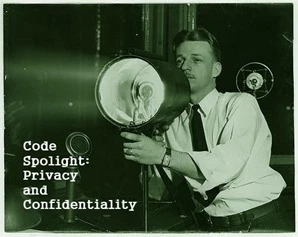 Here's a big one: section 1.07 of the NASW Code of Ethics, Privacy and Confidentiality. It begins like this:
Here's a big one: section 1.07 of the NASW Code of Ethics, Privacy and Confidentiality. It begins like this:
(a) Social workers should respect clients' right to privacy. Social workers should not solicit private information from clients unless it is essential to providing service or conducting social work evaluation or research. Once private information is shared, standards of confidentiality apply.
...and continues on through the alphabet to:
(r) Social workers should protect the confidentiality of deceased clients consistent with the preceding standards.
That's a lot of Code. Which means lots of opportunity for question writers to come up with licensing exam items. Also, this is important stuff. Expect to see Privacy and Confidentiality on the big test.
There's a lot to get straight here. Duty to warn/protect, protected health information, substance abuse records, etc. Dr. Frederic Reamer lends a hand in this Eye on Ethics column, Revisiting the Limits of Client Confidentiality. Another column handles When to Break Confidentiality With Minors. Both recommended. From the first:
Unlike earlier generations of social workers, today's practitioners must master complex case law, federal and state legislation and regulations, as well as guidelines in the Code of Ethics to help them think through when and how to intervene when clients pose a potential danger to others.
Today's practitioners--that's you! Especially you the ideal social worker you're imagining yourself to be as you sit for the exam.
Good luck!
For realistic online social work exam practice about Code of Ethics section 1.07 and much more, sign up.

 Here's a big one:
Here's a big one: